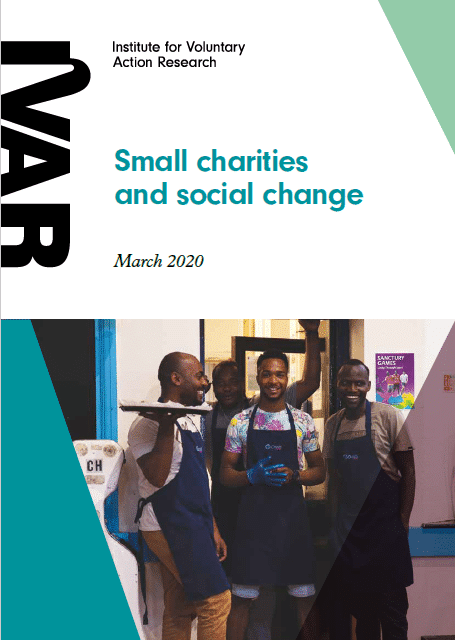
Advocacy and social change
Explore how and why small charities are challenging, shaping and changing policy, practice and attitudes.
Small charities and social change
Changes small charities can influence
Small charities can be flexible, lithe, focused, fleet of foot and close to the people they seek to support. They often have specialist expertise because they pick up the pieces that others do not, ‘fighting for the rights and dignity of individuals who are otherwise unrepresented’. They are able to capitalise on the direct connection they have with their beneficiaries to spot gaps, and they have connections that allow them to leverage change in a way that gives them ‘clout’, despite their size. They are able to talk from their own experiences, and those of the people they support, as well as using their networks to bring different individuals and groups in the community together to find common ground, to influence local public attitudes, and to influence local responses to a particular group or issue.
The kinds of changes they can influence are:
- Improving individuals’ access to services, so that they get the right support when they need it
- Empowering individuals with direct experience of the issues to have the confidence and skill to make their own voices heard
- Influencing the introduction or revision of policies and legislation to reflect and respond to the nuance, detail and complexity of the issues
- Ensuring adherence to existing government guidelines that had previously been inconsistently applied
- Introducing or revising practices after being piloted and modelled by small charities
- Encouraging a more informed public narrative, based on facts and real stories rather than rumours
How you can influence change
Tools
- Gathering evidence to inform practice and policy. Often this comes from the experience of frontline one-to-one advocacy and other forms of service delivery over the year, and the patterns that become apparent.
- Offering training and consultancy to practitioners. Building trusting relationships is important. West Yorkshire Community Chaplaincy Project (WYCCP), for example, said that the trust it had built up with individuals from the police and the NHS meant that those organisations were now coming to WYCCP for advice and help.
- PR and promotional activities. Disseminating and promoting their work was an important activity, especially for those who are developing new ways of working or carrying out research.
- Partnerships, networks and alliances. These might be for mutual support, to strengthen voice, or to bring multiple voices into policy design. For example, The Refugee Council partnered with Asylum Support Appeals Project (ASAP) because ‘ASAP has more immediate ready access to the client base, for case studies and so on. Although we can do that, we don’t have direct contact’.
- Influencing policy. Engaging with local and national decision makers was seen as hugely important, with an emphasis on building relationships over time.
- Using arts and storytelling. Creative tools can make sensitive and complex issues more accessible and understandable to people across different cultures and backgrounds. For example, Agenda’s #Thisismystory campaign enables women to tell their stories in their own words, whenever they are ready to do so.
- Supporting the conversation. Small, consistent actions were sometimes just as effective as drafting a policy briefing or launching a public campaign.
Working inside and outside the system
Our case study organisations had thought carefully about whether they would be most effective working to influence change from inside or outside the system. For most of our organisations, ‘the system’ is a shorthand for public legislation, policies and structures that affect the lives of the people they serve and represent. Many place great emphasis on building relationships with key people within the system, often over many years, in order to create confidence with those they aim to influence. In contrast, ‘outsider’ strategies are more public focused and combative by nature – with the aim of, for example, raising the temperature on an issue through a public campaign or challenging decisions and practices through litigation.
The voices of people with direct experience
Our case study organisations demonstrated determination that the voices of the people they served or represented should be heard in any strategy to promote social change. For them, effective empowerment means:
- Value: Giving people with direct experience the opportunity to speak for themselves and about their direct experience of an issue is powerful – for them, for those with similar experiences and for policy makers.
- Variety: There a range of ways in which this can be achieved, from individuals with direct experience taking a lead, to an organisation speaking on their behalf. Multiple factors, e.g. context, timing, available resource, will dictate these choices.
- Diversity: Careful attention and creativity are needed to ensure that a variety of voices are heard.
- Support: Enabling people to represent themselves needs to be backed up with training and support. It may take time before they are ready – and some may never wish to do this.
- Duty of care: Organisations and those they are working with need to think carefully about whether and when it is, or is not, appropriate for people with direct experience to be in the spotlight. It may risk undue exposure, even re-traumatisation.
- Moving on: Organisations need to allow those that they are supporting to speak out to step back if they wish to, and to be given the support they need to do so – otherwise they can become trapped in the role of spokesperson for people with experience when they are ready to move on.
Strengthen your contribution
Promoting social change is a valid and valuable part of small charities’ work
Small charities’ frontline work gives them legitimacy in speaking up. The evidence and experience they bring comes with the power of personal experience and knowledge. Both front-line staff and the people they serve often find it very motivating to know that the organisation has a voice and can make a difference in the outside world.
Social change work is not an add-on and needs to be resourced
Funders concerned with making a lasting difference need to recognise that, for small organisations, front-line service delivery and social change work can’t be separated – and they both need to be resourced. One way of doing this is for funders to explicitly say they fund social change work, and to include a dedicated budget line in their application forms.
There are many different ways to promote social change
It can be as small as retweeting commentaries and research, modelling new ways of working, through to launching a major public campaign. Every contribution has the potential to create better policy, practice and services.
People with direct experience need to be empowered to raise their voices and be heard
There are many ways in which people with direct experience can drive, develop or support social change work. The priority must be for individuals to be able to make an informed choice about how and how far they want to engage with this work, and to have the support they need to stay safe.
Larger charities and organisations providing training, resources and peer support need to recognise the value of small charities
They bring people to the table who would not otherwise be heard and provide evidence of how policies are playing out on the ground. They may be very focused in specialist areas and thus have niche expertise.
Case studies
You may also be interested in

Beyond the Buzzword: Systems Change in Language, Planning and Practice
As part of my internship with IVAR, ‘systems change’ was one of the topics…

Small charities and social change
Advocacy, lobbying, campaigning and influencing are essential tools in the effort to tackle inequality…

How can small charities be heard?
We recently hosted a conversation for small charities with those who fund and support…
